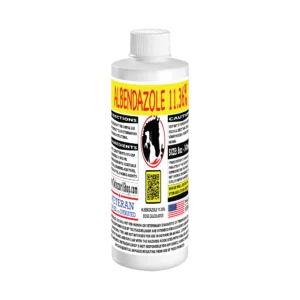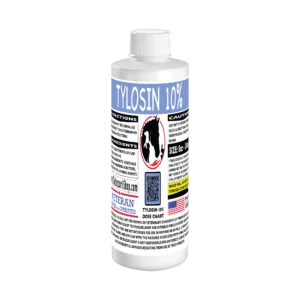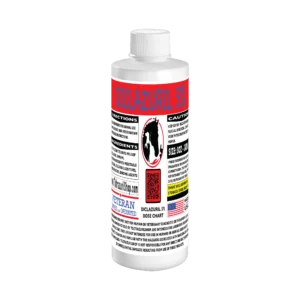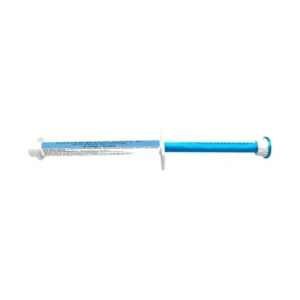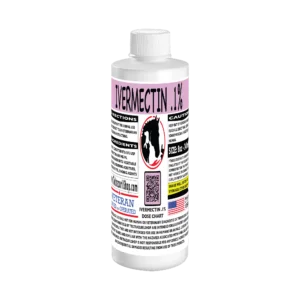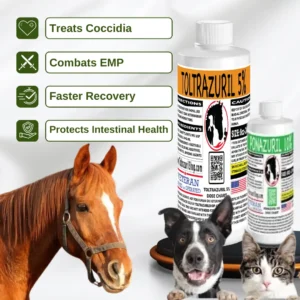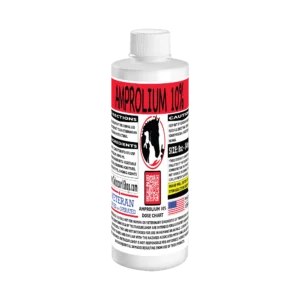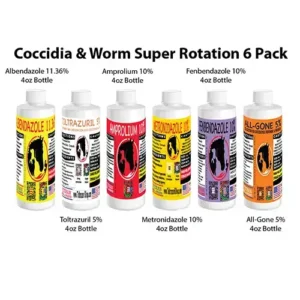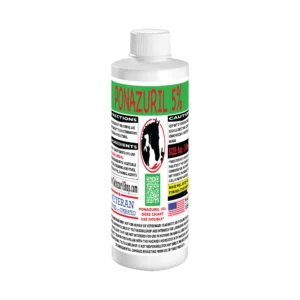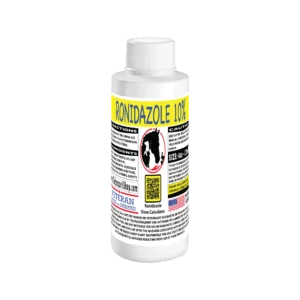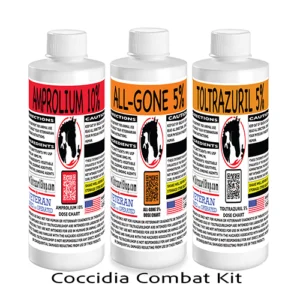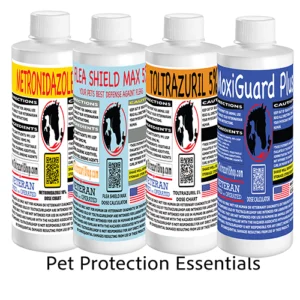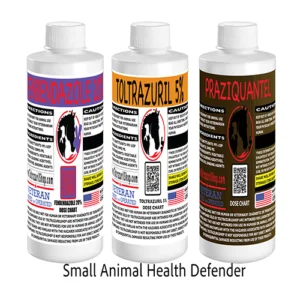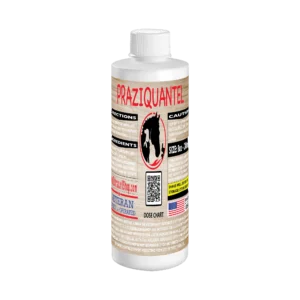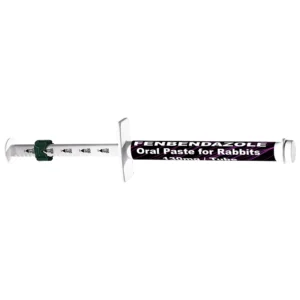-
Animal Products
Albendazole 11.36% Liquid Solution
$9.95 – $219.95 Select options This product has multiple variants. The options may be chosen on the product pageRated 0 out of 5 -
Animal Products
Small Animal Coccidia & Wormer Bundle
Rated 0 out of 5$199.95Original price was: $199.95.$79.95Current price is: $79.95. Add to cart -
Animal Products
EPM & Ulcer Eliminator Bundle for Horses
Rated 0 out of 5$269.95Original price was: $269.95.$199.95Current price is: $199.95. Add to cart -
Animal Products
Tylosin 10% Liquid Solution
$15.96 – $99.95 Select options This product has multiple variants. The options may be chosen on the product pageRated 0 out of 5 -
Animal Products
Diclazuril 5% Liquid Solution
$19.95 – $29.95 Select options This product has multiple variants. The options may be chosen on the product pageRated 0 out of 5 -
Animal Products
Omeprazole Paste for Horse Ulcer Treatment | 2.28g Paste Tube
$0.00 – $599.95 Select options This product has multiple variants. The options may be chosen on the product pageRated 0 out of 5 -
Animal Products
Metronidazole 10% Liquid Solution
$24.95 – $399.95 Select options This product has multiple variants. The options may be chosen on the product pageRated 0 out of 5 -
Animal Products
Ivermectin Liquid Solution
$6.95 – $129.95 Select options This product has multiple variants. The options may be chosen on the product pageRated 0 out of 5 -
Animal Products
Toltrazuril Liquid Solution
$4.95 – $999.95 Select options This product has multiple variants. The options may be chosen on the product pageRated 0 out of 5 -
Animal Products
Amprolium 10% Liquid Solution
$5.95 – $54.95 Select options This product has multiple variants. The options may be chosen on the product pageRated 0 out of 5 -
Animal Products
All-Gone 5% Oral Suspension for Pets
$19.95 – $349.95 Select options This product has multiple variants. The options may be chosen on the product pageRated 0 out of 5 -
Animal Products
Max EPM Bundle for Horses – Toltrazuril Shop
Rated 0 out of 5$169.99Original price was: $169.99.$99.95Current price is: $99.95. Add to cart -
Animal Products
Small Animal Coccidia & Wormer Bundle 6 Pack Rotation
Rated 0 out of 5$149.99Original price was: $149.99.$89.95Current price is: $89.95. Add to cart -
Animal Products
Small Animal Coccidia & Wormer Bundle 8oz Bottles
Rated 0 out of 5$234.99Original price was: $234.99.$139.95Current price is: $139.95. Add to cart -
Animal Products
Ponazuril Liquid Solution
$19.95 – $499.95 Select options This product has multiple variants. The options may be chosen on the product pageRated 0 out of 5 -
Animal Products
Nitenpyram Flea Shield Max Flea & Tick Solution
$19.95 – $199.95 Select options This product has multiple variants. The options may be chosen on the product pageRated 0 out of 5 -
Animal Products
Ronidazole 10% Liquid Solution
Rated 0 out of 5$63.99Original price was: $63.99.$29.95Current price is: $29.95. Select options This product has multiple variants. The options may be chosen on the product page -
Animal Products
Ultimate Wormer Rotation Pack – 4oz Bottle of Each
Rated 0 out of 5$149.95Original price was: $149.95.$79.95Current price is: $79.95. Add to cart -
Animal Products
Coccidia Combat Kit
Rated 0 out of 5$99.99Original price was: $99.99.$59.95Current price is: $59.95. Add to cart -
Animal Products
Pet Protection Essentials
Rated 0 out of 5$319.99Original price was: $319.99.$189.95Current price is: $189.95. Add to cart -
Animal Products
Small Animal Health Defender
Rated 0 out of 5$189.99Original price was: $189.99.$109.95Current price is: $109.95. Add to cart -
Animal Products
Levamisole 10% Liquid Solution
$12.95 – $249.95 Select options This product has multiple variants. The options may be chosen on the product pageRated 0 out of 5 -
De-Wormers
Blackout EPM & Coccidia Solution: Fast-Acting Treatment for Coccidiosis and EPM Symptoms
Rated 0 out of 5$119.99Original price was: $119.99.$69.95Current price is: $69.95. Add to cart -
Cattle
Spectinomycin 5% Liquid Solution – Effective Antibiotic for Livestock and Poultry Health
$19.95 – $59.99 Select options This product has multiple variants. The options may be chosen on the product pageRated 0 out of 5 -
Cat Dewormer
Praziquantel Liquid Solution
$22.95 – $39.95 Select options This product has multiple variants. The options may be chosen on the product pageRated 0 out of 5 -
Animal Products
Fenbendazole Liquid Dewormer
$14.95 – $409.95 Select options This product has multiple variants. The options may be chosen on the product pageRated 0 out of 5 -
Animal Products
MoxiGuard Plus – Moxydectin / Pyrantel / Sarolaner Solution
$39.95 – $199.95 Select options This product has multiple variants. The options may be chosen on the product pageRated 0 out of 5 -
De-Wormers
Pyrantel 5% Liquid Solution
$12.95 – $159.95 Select options This product has multiple variants. The options may be chosen on the product pageRated 0 out of 5 -
Animal Products
Fenbendazole Paste | Best Vet-Approved Parasite Protection | 130mg / Tube
Rated 0 out of 5$9.95Original price was: $9.95.$6.95Current price is: $6.95. Add to cart -
Animal Products
Horse Ulcer Treatment | 2.28g Paste Tube
$0.00 – $599.95 Select options This product has multiple variants. The options may be chosen on the product pageRated 0 out of 5 -
Animal Products
Flea Shield Max Flea & Tick Solution
$19.95 – $199.95 Select options This product has multiple variants. The options may be chosen on the product pageRated 0 out of 5 -
Animal Products
Fen Ben Pro Liquid Dewormer
$14.95 – $409.95 Select options This product has multiple variants. The options may be chosen on the product pageRated 0 out of 5
Coccidia in Dogs – Trusted Solutions for Animal Health
Coccidiosis is a common parasitic infection that affects dogs, cats, horses, and other livestock. Left untreated, it can lead to severe health complications, impacting your pet’s well-being and even proving fatal in young or immunocompromised animals. At Coccidia in Dogs, we are dedicated to providing high-quality, vet-approved treatments to help pet owners, breeders, and farmers manage and eliminate coccidia and other harmful parasites.
Our parent company, Toltrazuril Shop, has been a trusted name in the animal health industry, supplying reliable and effective solutions for years. We bring the same level of expertise, affordability, and convenience to our customers, ensuring that they have access to the best treatments for their animals.
Your Go-To Source for Coccidia and Parasite Control
At Coccidia in Dogs, we offer an extensive range of antiparasitic treatments, including Toltrazuril, Ponazuril, Amprolium, Fenbendazole, Metronidazole, and Ivermectin. These products are specially formulated to treat coccidiosis, worm infestations, and bacterial infections in dogs and other animals.
We understand that treating coccidia and other infections can be overwhelming, especially for pet owners who are dealing with a sick animal. That’s why we provide comprehensive product descriptions, easy-to-follow dosing instructions, and expert recommendations to help you make the right choice for your pet’s health.
Why Choose Coccidia in Dogs?
Choosing the right treatment for your pet’s health and wellness is crucial. Here’s why thousands of pet owners and breeders trust us:
Vet-Approved and Proven Treatments
All our products are sourced from trusted manufacturers and have been proven effective in treating coccidia and other parasites in animals. We offer formulations that are commonly used by veterinarians and breeders to ensure fast and effective parasite control.
Wide Selection of High-Quality Products
From coccidia treatments to dewormers, we provide a variety of solutions tailored for different animal species. Our selection includes:
- Toltrazuril and Ponazuril Solutions – Trusted treatments for coccidiosis in dogs, cats, and livestock.
- Amprolium and Diclazuril Products – Effective for preventing and managing coccidial infections in animals.
- Fenbendazole and Ivermectin Dewormers – Reliable solutions for treating intestinal parasites in pets and farm animals.
- Metronidazole and Tylosin Antibiotics – Essential for treating bacterial infections and gastrointestinal disorders.
- Oral Suspensions, Pastes, and Liquid Solutions – Easy-to-administer medications for various animal species.
Whether you are a pet owner, breeder, or livestock caretaker, our store has the right treatment for your needs.
Affordable Prices and Bulk Discounts
We believe that high-quality parasite treatments should be accessible and affordable. That’s why we offer competitive prices, with special discounts on bulk orders for breeders and farmers. You can rest assured that you’re getting the best value for your money without compromising on quality.
Easy Online Shopping and Secure Checkout
Buying coccidia treatments has never been easier. Our website is designed to offer a seamless shopping experience, with:
- Detailed Product Descriptions – Know exactly what you’re purchasing with clear dosing and administration guidelines.
- Secure Payment Options – Shop with confidence using trusted and secure payment methods.
- Fast Shipping Across the U.S. – Get your order quickly so you can start treating your pet without delays.
We prioritize customer satisfaction, ensuring that each order is processed and delivered in a timely manner.
Expert Support and Guidance
Not sure which product is right for your pet? Our team is always available to assist you with:
- Product Recommendations – Get help selecting the most effective treatment for your animal’s condition.
- Dosing Instructions – Ensure safe and proper administration of medications.
- General Pet Health Advice – Learn more about preventing and managing parasitic infections in pets and livestock.
We are committed to helping you make informed decisions about your pet’s health.
Understanding Coccidiosis in Dogs
What is Coccidia?
Coccidia are microscopic parasites that infect the intestinal tract of animals, leading to a condition known as coccidiosis. It is particularly common in puppies, kittens, and young livestock, as their immune systems are not fully developed.
Symptoms of Coccidiosis
Coccidiosis can range from mild to severe, depending on the animal’s age, immune system, and the level of infection. Common symptoms include:
- Watery or Bloody Diarrhea – A key indicator of a serious coccidia infection.
- Loss of Appetite – Infected animals may refuse to eat, leading to weakness.
- Weight Loss and Dehydration – Persistent diarrhea can cause rapid weight loss and dehydration.
- Lethargy and Weakness – Affected animals may appear weak, tired, and unresponsive.
How is Coccidia Transmitted?
Coccidia spreads through contact with infected feces, contaminated water, and dirty environments. Puppies and kittens often contract coccidia from their mother or through unsanitary living conditions.
How to Treat and Prevent Coccidia?
- Immediate Treatment – Using Toltrazuril, Ponazuril, or Amprolium can effectively eliminate coccidia parasites.
- Good Hygiene Practices – Regularly clean food bowls, water containers, and living areas to reduce infection risks.
- Preventative Deworming – Using Fenbendazole or Ivermectin can help keep parasites under control.
Early detection and proper treatment can prevent serious complications and help your pet recover quickly.
Our Most Popular Products
At Coccidia in Dogs, we offer a comprehensive selection of products tailored for coccidia treatment and parasite control. Some of our best-selling treatments include:
- Toltrazuril 5% and Toltrazuril 10% Solutions – A highly effective treatment for coccidiosis in dogs, cats, and livestock.
- Ponazuril Oral Suspension – A trusted option for treating coccidia in puppies and kittens.
- Amprolium 10% Liquid Solution – A go-to treatment for poultry, livestock, and small animals.
- Fenbendazole Liquid Dewormer – A broad-spectrum dewormer for dogs, cats, and horses.
- Metronidazole 10% Liquid Solution – Ideal for treating bacterial and parasitic infections in animals.
We also offer wormer bundles and rotational treatment packs to ensure long-term protection against parasites.
Order Today and Protect Your Pet’s Health
Coccidiosis and parasitic infections can be serious if left untreated, but with the right treatments, you can safeguard your pet’s health and well-being. At Coccidia in Dogs, we provide affordable, effective, and veterinarian-trusted products to help you combat parasites quickly and efficiently.
Explore our online store today and find the best coccidia treatments, dewormers, and parasite control solutions for your pet or livestock.
If you have any questions or need assistance, our team is ready to help. Shop now and give your pets the protection they deserve!
